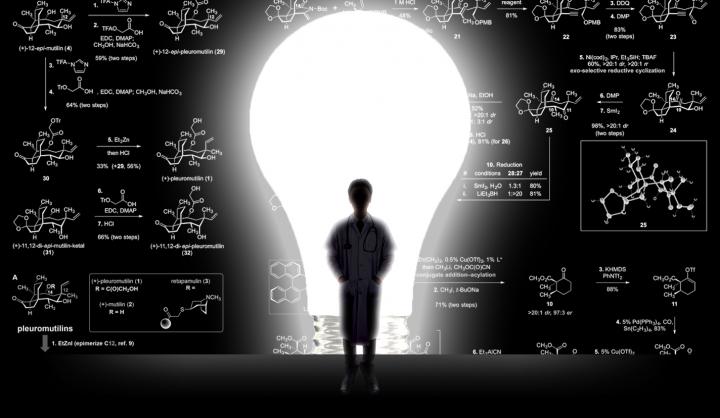
Credit: Michael S. Helfenbein
New Haven, Conn. – Yale University scientists have developed a novel chemical process that may lead to the creation of a new class of antibiotics.
The discovery comes at a time when more types of bacteria are becoming resistant to existing antibiotics, increasing the occurrence of lethal infections. The ability to create new antibiotics would have significant ramifications for medical treatment and public health, said the researchers.
"This is one way to focus our talents as synthetic chemists in a direction that can immediately help patients," said Seth Herzon, a chemistry professor at Yale and member of the Yale Cancer Center. Herzon is principal investigator of a new study published June 1 in the journal Science.
Yale postdoctoral fellow Stephen Murphy and Yale graduate student Mingshuo Zeng are co-authors of the study. Both are members of the Herzon Lab.
The new process makes it possible to create molecules related to the natural product pleuromutilin from simple commercial chemicals in the laboratory. Pleuromutilin is produced by a fungus and was found to have useful antibacterial properties in the early 1950s. Since then, scientists in academia and the pharmaceutical industry have created thousands of pleuromutilin derivatives by a process known as semisynthesis, which involves chemically modifying pleuromutilin itself. However, a large proportion of these derivatives only vary at a single position in the molecule. A practical full synthesis, which would make a wealth of additional antibiotics possible, has remained elusive.
Herzon first attempted to find a solution in 2008. "We worked on this project for a few years when I started at Yale, but didn't record much success," Herzon said. "The pharmaceutical industry has historically been the driving force behind antibiotics development. However, antibiotics are essentially at the bottom of the list in terms of investment return. Consequently, most major pharmaceuticals have walked away from this area."
This has led to a dearth of new drugs to combat resistance, Herzon added. "As the anti-bacterial crisis kept getting worse, we decided we had to pick this back up and conceive an entirely different approach," he said.
Herzon and his colleagues discovered they could prepare an isomer of pleuromutilin — a compound that has the same connectivity, but with a different arrangement of atoms — and rearrange it in the final steps of the synthesis to pleuromutilin. The discovery allowed the group to vault past some of the previous roadblocks and achieve the full synthesis of pleuromutilin. Moreover, these isomers have better antibacterial properties than pleuromutilin itself, opening the door to the preparation of improved compounds.
"Making pleuromutilin is great, but we are more interested in the non-natural compounds we can access through synthesis. We're continuing to refine the synthesis, and the sky is the limit now, in terms of the modifications we can make," Herzon explained. "We're going to start testing compounds immediately. If all goes well we ultimately hope to move our compounds into clinical trials to treat drug-resistant infections."
###
The National Institutes of Health, the National Sciences and Engineering Research Council of Canada, and Yale University provided financial support for the research.
Media Contact
Jim Shelton
[email protected]
203-432-3881
@yale
http://www.yale.edu
############
Story Source: Materials provided by Scienmag





